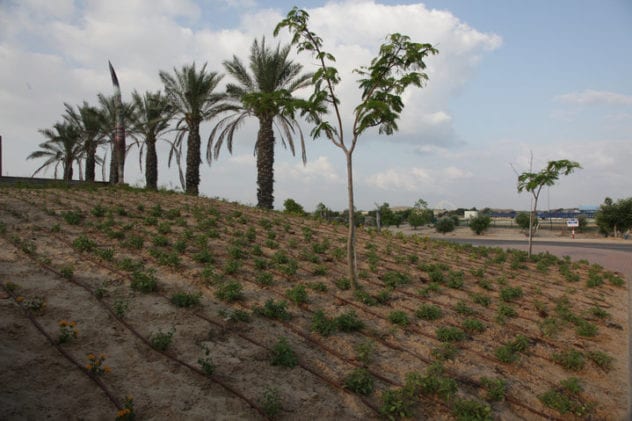

Investing in peace and the environment makes sense. Palestine and Israel are on the same side of the Paris Accord. In a world of scarce resources that is hotter and dryer than ever before the lack of water for people and nations will be a constant cause for further conflict. The Middle East, especially the land lived in by the peoples of Jordan, Israel and Palestine ― and now more than 1.3 million Syrian refugees – is small ― smaller than the state of New York.
If one nation pollutes, they all experience repercussions ― if wastewater is dumped in the Mediterranean it washes up on the others’ beaches; if water is not available for domestic and agricultural use it will disrupt the lives of their peoples. Much of the land is already a desert, some even hyper-arid ― receiving less than 1 inch of rain a year. Little grows and what does requires intelligent conservation and sophisticated reuse of water. Sunlight and thus solar power is plentiful for those with the land and know-how to capture it. Rivers and aquifers are shared. There is no escaping the fact that nature knows no borders.
Palestinians, Jordanians and Israelis are working together on cross-boundary solutions to environmental problems. Surprised? Well, you might be. The Arava Institute for Environmental Studies ― located in the south of Israel, largely housed on one of the few remaining traditional kibbutz communities, has been working to educate young leaders from all three of these societies and build trust for twenty years. This has lead to cooperative research and development in renewable energy, water conservation, as well as wastewater treatment and reuse and sustainable agricultural innovation.
How can a small Institute in the middle of nowhere accomplish this? As Margaret Mead famously said, “Never doubt that a small group of thoughtful committed citizens can change the world; indeed, it’s the only thing that ever has.” In fact, the Arava Institute, from its inception was committed to educating and working beyond borders. At the Arava Institute students ― Jordanians, Palestinians, Israelis and citizens of the world, largely North Americans ― are actively trained to respect each other by learning about environmental challenges together and by intensive peace-building leadership seminars. These students are increasingly in positions to make a cooperative future possible.
Why should we care about the resources of Israel’s neighbors? Beyond Israel’s self-interest in clean beaches and aquifers, Israel as a leader in water reuse and conservation, as well as desalinization, and knows that stable neighbors are an essential element in securing peace; and water and accessible energy are essential for economic, social and political stability. Climate change will have a major impact on an already water-scarce region. Only through cross-border cooperation will the region be able to adapt peacefully to higher temperatures, less rainfall, biodiversity loss and the shift in climate zones.
Looking for solutions, as partners on environmental issues, is part of the way forward. If the Arava Institute can make progress then hopefully so can our governments and leaders. We must look forward to building a more peaceful, sustainable and healthy future that will allow for the region to teach about the possibilities of peace and the importance of environmental cooperation today and for our future.

